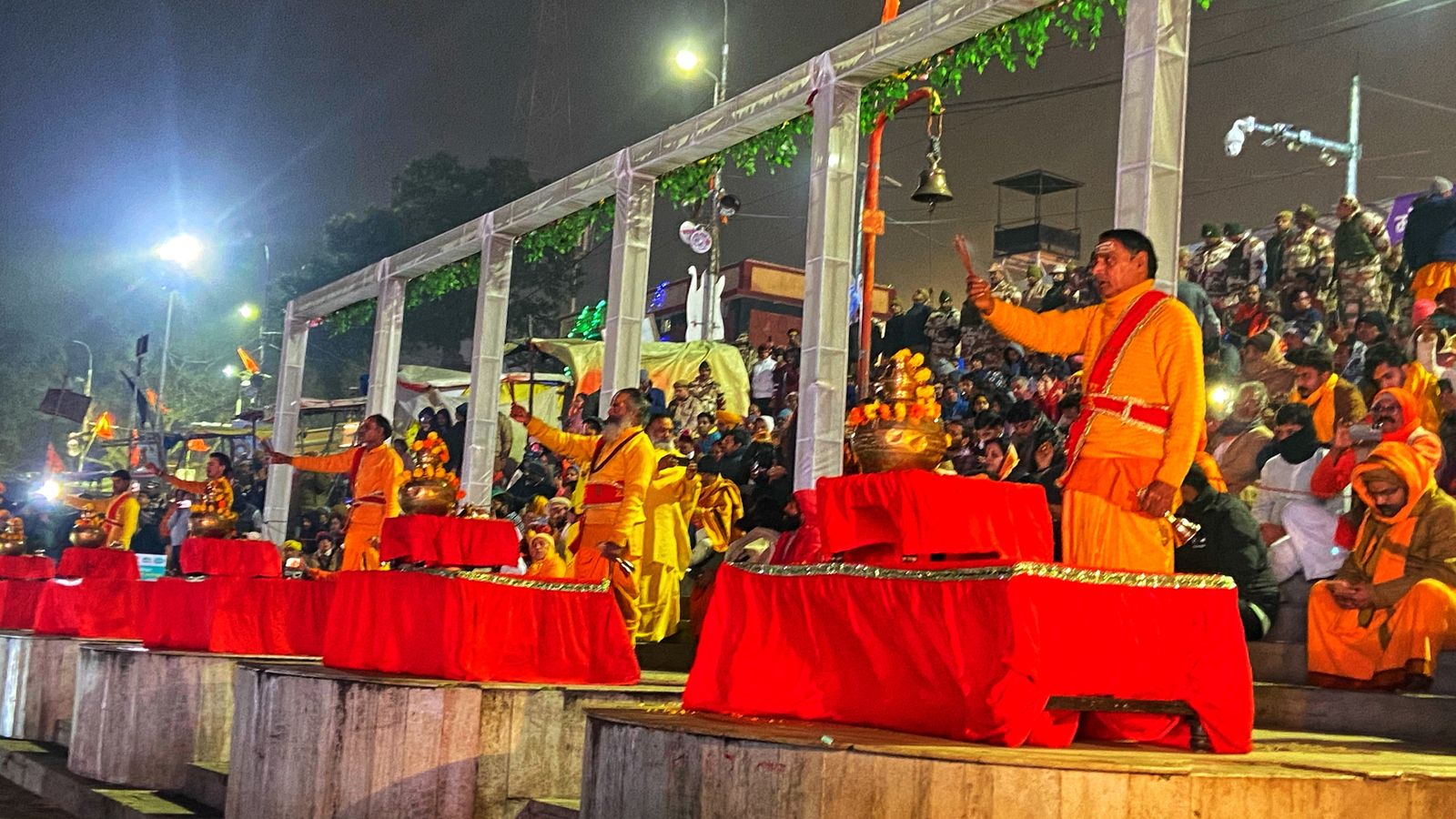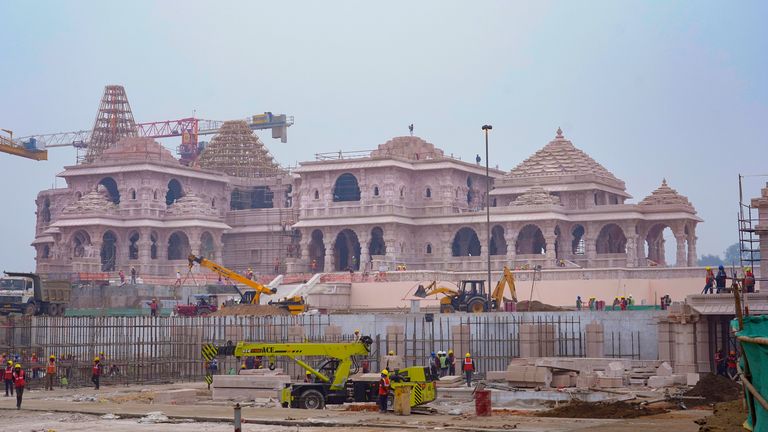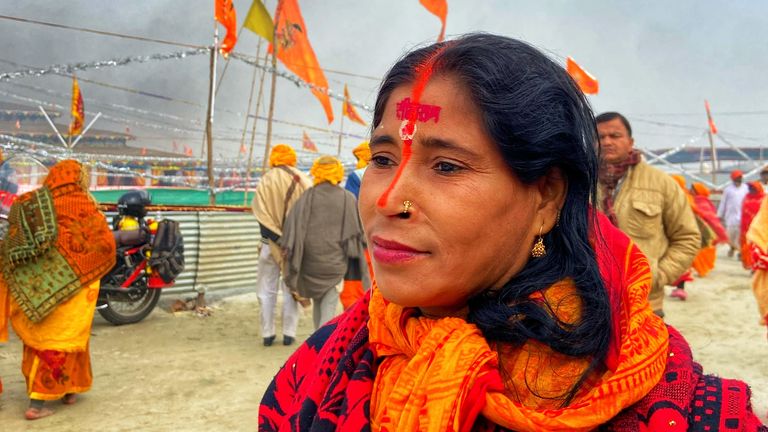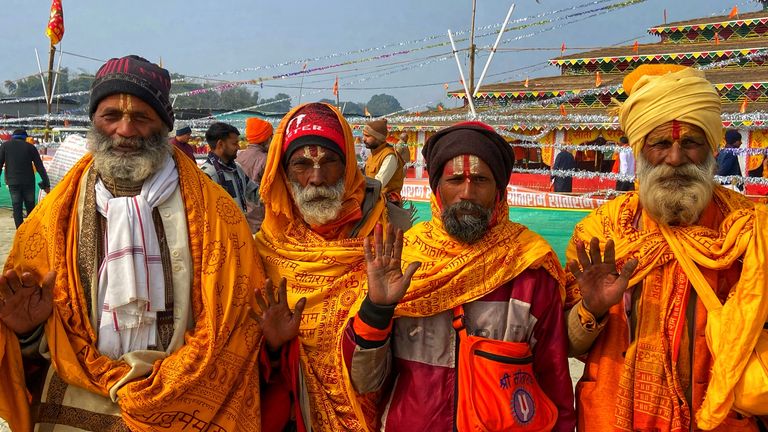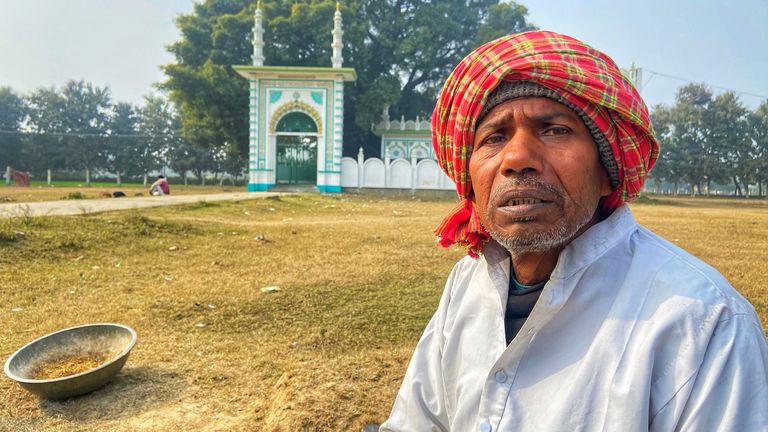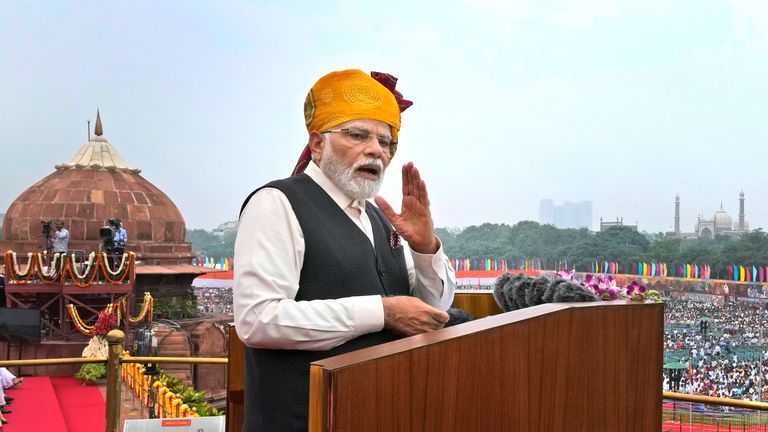A 19th-century dispute, which has gone through decades of court procedures, has finally culminated in the Ram Temple.
Consecrated by Prime Minister Narendra Modi, this temple site is believed to be the birthplace of Lord Ram, one of the most revered gods in the Hindu pantheon.
The city of Ayodhya in India’s most populous state Uttar Pradesh is all decked up.
Saffron flags, cut-outs of Lord Ram, strings of marigold flowers, decorative lights shaped in Hindu symbols and new paintwork have transformed this sleepy, little rundown town.
Large LED screens display the consecration across the country, while Indian embassies carry it across the world and even on a sponsored screen at Times Square in New York.
Namit Khanna, who has come from Singapore to witness the ceremony, tells Sky News “It’s a civilisation moment that I feel for all of us in India, and it has been a struggle of so many years of our ancestors.”
Rishab Kaushal says: “This is like a different world, the 500-year gap has been completed. We are all so happy. We’ve been given a new festival… Today we’ve been given our Lord.”
Holding her 7-month-old baby, Preeti says: “Our forefathers had died waiting for such a moment. And today we are so happy. And we wish to thank Modi for this, that we can see the temple constructed in our lifetime.”
Mr Modi is omnipresent. His presence in the temple town cannot be missed and everyone credits him with the construction of the Ram Temple.
While only 8,000 people have been officially invited over 100,000 have converged on the city including Bollywood royalty, industrialists, cultural icons, sportspersons, and diplomats.
According to the Temple Trust, donations have exceeded over 4trn rupees (£38bn), pouring in from far and wide.
Conspicuous of their absence are opposition party leaders who have called the inauguration a political project by Mr Modi and his ruling Hindu nationalist Bharatiya Janata Party. They will stay away from today’s programme and come another day.
A number of senior Hindu priests and heads of four major shrines, the Shankaracharyas, have also refused to attend on the grounds that consecrating an unfinished temple undermines scripture.
For years the construction of the temple has been one of the most controversial and contentious issues in modern India.
Both Hindus and Muslims have laid claim to the 2.77-acre plot – the size of a football field – on which stood the Babri Mosque since the 16th century. Hindus believe that the Mughal Emperor Babur destroyed an original Ram temple and built the Babri mosque on the exact same spot in 1528.
In 1949, idols of Lord Ram were found in the central dome of the mosque and a large number of Hindus began to pray there. This led to protests by Muslims and the government locked the gates of the mosque, declaring it a disputed site.
In the 1980s, right-wing Hindu organisations and the BJP seized on the Ram Janam Bhoomi Ayodhya movement as a sort of Hindu renaissance. A promise to retake the land and rebuild the temple propelled them into centre stage of national politics.
On 6 December 1992, the Babri mosque was destroyed by thousands of right-wing volunteers who called themselves ‘Kar Sevaks’. The events triggered religious riots across the country in which about 2,000 people, most of them Muslim, were killed.
Subsequently, the site was heavily protected and a series of ongoing court cases by various groups were fought for ownership.
On 9 November 2019 in a unanimous verdict by a five-judge bench, the Supreme Court of India awarded the disputed site to the Hindus, rejecting the Muslims’ claim.
The court said “Archaeological evidence supports an underlying structure of Hindu origin. The Muslim parties failed to establish exclusive possession of the disputed land.”
The court directed the government to give an alternate piece of land to the Muslims, about 25km away in a village called Dhannipur.
Except for a broken razorwire fence, there are no signs of construction at this site.
Sitting on a charpoy on the vacant land, 72-year-old Mohammad Islam tells Sky News: “Look, it was wrong, but we have to live within the confines of the constitution. We have to adhere to it when a decision is right or when it’s not right. But we have to move on for development, let’s leave behind issues of temples and mosques now.”
Shahbaz Khan, a 33-year-old welder says: “Modi is the prime minister of the country, not just one community. We have no issues about the temple, we are happy. But there must be development for us too. The ruling BJP motto is ‘development for one and all’, but we see development is just for one.”
The Ayodhya issue has polarised the country for decades and the rift between the majority Hindus with their 182 million Muslim brethren has widened.
Hinduism is almost 4,000 years old and is the religion of almost 80% of the population. The first Islamic dynasty was established in the 13th century and Muslims constitute around 14% of the population.
Since Mr Modi’s Bharatiya Janata Party has been in power since 2014 there has been a deepening of social divide and a display of muscular Hindu nationalism that has contributed to religious tensions.
Restrictions on the slaughter and sale of cows (revered by Hindus) have led to vigilantism and the killing of a number of Muslim traders transporting cattle.
Today’s ceremony will be seen as a political victory for Mr Modi and his party and will further consolidate his popularity with the majority.
It will also help him garner more votes for the upcoming general elections due in the summer, which he is widely believed to win.
One hopes that now with the construction of the Ram Temple the country’s deepening religious fissures and animosity between the two communities finally ends.
